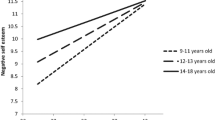Abstract
The EMBU (Egna Minnen Beträffande Uppfostran) is a self-report questionnaire developed to assess memories of adults about their parents' rearing practices. In the present study, an exploratory factor analysis was carried out on items of the EMBU-P, a new version of the EMBU especially designed to obtain ratings from parents about their own rearing behaviour with their children. The factor analysis yielded a structure similar to that obtained with the original EMBU (Rejection, Emotional Warmth, Control Attempts and Favouring Subject), but composed of fewer items. The internal consistency was adequate for the three major scales. Some significant correlations emerged between the EMBU-P scales. The Rejection scale correlated negatively with the Emotional Warmth scale and positively with the Control Attempts scale. The latter also correlated positively with Emotional Warmth. There were no significant correlations between the scales and the age of the parents. The sex of the parents was significantly associated with the EMBU-P scores.
Similar content being viewed by others
References
Anasagasti JI, Denia M (1988) Opiate addicts and their perceived parental rearing. Acta Psychiatr Scand 78: 121–126
Arrindell WA, Van der Ende J (1984) Replicability and invariance of dimensions of parental rearing behavior: further Dutch experiences with the EMBU. Pers Individ Differ 5: 671–682
Arrindell WA, Emmelkamp PMG, Brilman E, Monsma A (1983) Psychometric evaluation of an inventory for assessment of parental rearing practices: a Dutch form of the EMBU. Acta Psychiatr Scand 67: 163–177
Arrindell WA, Perris C, Eisemann M, Perris H, Van der Ende J, Ross M, Benjaminsen S, Gaszner P, del Vecchio M (1986) Cross-national generalizability of patterns of parental rearing behaviour: invariance of EMBU dimensional representations of healthy subjects from Australia, Denmark, Hungary, Italy and The Netherlands. Pers Individ Differ 7: 103–112
Arrindell WA, Perris H, Denia M, Van der Ende J, Perris C, Kokkevi A, Anasagasti JI, Eisemann M (1988) The constancy of structure of perceived parental rearing style in Greek and Spanish subjects as compared with the Dutch. Int J Psychol 23: 3–23
Arrindell WA, Kwee MGT, Methorts GJ, Van der Ende J, Pol E, Moritz BJM (1989) Perceived parental rearing styles of agoraphobic and socially phobic in-patients. Br J Psychiatry 155: 526–535
Baumrind D (1971) Current patterns of parental authority. Child Dev 4: 1–103
Benjaminsen S, Krarup G, Lauritsen R (1990) Personality, parental rearing behaviour and parental loss in attempted suicide: a comparative study. Acta Psychiatr Scand 82: 389–397
Castro J, Toro J, Van der Ende J, Puig J (1990) Perceived parental rearing style in Spanish adolescents, children and parents: three new forms of the EMBU. In: Stefanis CN et al (eds.) Psychiatry, a world perspective, vol. IV. Elsevier, Amsterdam, pp 340–344
Castro J, Toro J, Van der Ende J, Arrindell WA (1993) Exploring the feasibility of assessing parental rearing styles in Spanish children with the EMBU. Int J Soc Psychiatry 39: 47–57
Cohen J (1988) Statistical power analysis for the behavioral sciences, 2nd edn. Erlbaum, Hillsdale, NJ
Ehiobouche I (1988) Obsessive-compulsive neurosis in relation to parental child-rearing patterns amongst Greek, Italian and Anglo-Australian subjects. Acta Psychiatr Scand 78: 115–120
Gerlsma C, Arrindell WA, Van der Veen N, Emmelkamp PMG (1991) A parental rearing style questionnaire for use with adolescents: psychometric evaluation of the EMBU-A. Pers Individ Differ 12: 1245–1253
Gerlsma C, Das J, Emmelkamp PMG (1993) Depressed patients' parental representations: stability across changes in depressed mood and specificity across diagnoses. J Affect Disord 27: 173–181
Hoffman ML (1975) Moral internalization, parental power and the nature of parent-child interaction. Dev Psychol 11: 228–239
Khalil N, Stark PM (1992) Do perceived parental rearing patterns influence social behaviour dimensions and disease severity in schizophrenia? Acta Psychiatr Scand 86: 146–152
Moos R, Moos B (1976) A typology of family social environments. Fam Process 15: 357–372
Olweus D (1980) Familial and determinants of aggression behavior in adolescents — a causal analysis. Dev Psychol 16: 644–660
Ownby RL, Murray JN (1982) Dimensions of parental behavior: results of cluster and factor analysis. Psychol Rep 51: 1045–1046
Parker G (1979) Reported parental characteristics of agoraphobics and social phobics. Br J Psychiatry 135: 555–560
Parker G (1983) Parental “affectionless control” as an antecedent to adult depression. A risk factor delineated. Arch Gen Psychiatry 40: 956–960
Parker G, Tupling H, Brown LB (1979) A parental bonding instrument. Br J Med Psychol 52: 1–10
Parker G, Barrett EA, Hickie IB (1992) From nurture to network: examining links between perceptions of parenting received in childhood and social bonds in adulthood. Am J Psychiatry 149: 877–885
Perris C, Jacobsson L, Lindström H, Von Knorring L, Perris H (1980) Development of a new inventory for assessing memories of parental rearing behaviour. Acta Psychiatr Scand 61: 265–274
Perris C, Arrindell WA, Perris H, Eisemann M, Van der Ende J, Von Knorring L (1986) Perceived depriving parental rearing and depression. Br J Psychiatry 148: 170–175
Pruett KD (1991) Family development and the roles of mothers and fathers in child rearing. In: Lewis ML (ed) Child and adolescent psychiatry. Williams and Wilkins, Baltimore, pp 215–221
Roe A, Siegelman M (1963) A parent-child relations questionnaire. Child Dev 34: 355–369
Ross MW, Campbell RL, Clayer JR (1982) New inventory for measurement of parental rearing patterns. Acta Psychiatr Scand 66: 499–507
Ross MW, Clayer JR, Campbell RL (1983) Dimensions of child-rearing practices. Acta Psychiatr Scand 68: 476–483
Schaeffer ES (1965) A configurational analysis of children's reports of parent behavior. J Consult Psychol, 29: 552–557
Slater PE (1962) Parent bahavior and the personality of the child. J Genet Psychol 101: 53–68
Tabachnick BG, Fidell LS (1983) Using multivariate statistics. Harper and Row, New York
Teleki JK, Powell JA, Dodder RA (1982) Factor analysis of parental behavior by children living in divorced and married families. J Psychol 112: 295–302
Author information
Authors and Affiliations
Rights and permissions
About this article
Cite this article
Castro, J., de Pablo, J., Gómez, J. et al. Assessing rearing behaviour from the perspective of the parents: a new form of the EMBU. Soc Psychiatry Psychiatr Epidemiol 32, 230–235 (1997). https://doi.org/10.1007/BF00788243
Accepted:
Issue Date:
DOI: https://doi.org/10.1007/BF00788243




